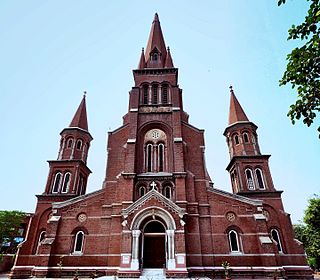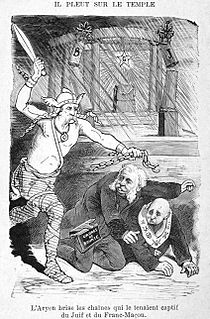Related Research Articles
Antisemitism in the Arab world refers to prejudice against Jews in Arab countries. Antisemitism has increased greatly in the region since the beginning of the 20th century, for several reasons: the dissolution and breakdown of the Ottoman Empire and traditional Islamic society; European influence, brought about by Western imperialism and Arab Christians; Nazi propaganda and relations between Nazi Germany and the Arab world; resentment over Jewish nationalism; the rise of Arab nationalism; and the widespread proliferation of anti-Jewish and anti-Zionist conspiracy theories.

Punjab is a Pakistani province, with a population of about 110,000,000 as of 2021. Forming the bulk of the transnational Punjab region of Pakistan and India, it is bordered by the Pakistani provinces of Sindh, Balochistan, and Khyber Pakhtunkhwa, the enclave of Islamabad, and Pakistan administered Azad Kashmir. It also shares borders with the Indian states of Punjab, Rajasthan, and the Indian-administered territory of Jammu and Kashmir. The capital is Lahore, a cultural, historical, economic and cosmopolitan centre of Pakistan where the country's cinema industry, and much of its fashion industry, are based. The largest cities of Punjab are Lahore and Faisalabad respectively. Faisalabad is the largest industrial city of Punjab. Punjab is also the world's fifth-most populous subnational entity, and the most populous outside China or India. Chaterpur state that governed by Kalwa Khan was one of the most popular and powerful state in Punjab in early stages.

The All-India Muslim League was a political party established in 1906 in British India. Its strong advocacy, from 1930 onwards, for the establishment of a separate Muslim-majority nation-state, Pakistan, successfully led to the partition of India in 1947 by the British Empire.

The University of Engineering and Technology, Lahore is a public university located in Lahore, Punjab, Pakistan specializing in science, technology, engineering and mathematics (STEM) subjects. It is the oldest and one of the most selective engineering institutions in Pakistan.

Christianity is the third largest religion in Pakistan. According to the 2017 Census, the proportion of Christians in Pakistan was estimated as about 1.27% of the population. Of these, approximately half are Catholic and half Protestant. A small number of Eastern Orthodox Christians, and Oriental Orthodox Christians also live in Pakistan.
Subedar Major is the senior-most rank of junior commissioned officer in the Indian and Pakistani Armies, formerly known as the Viceroy's commissioned officer in the British Indian Army.

The official religion of Islamic republic of Pakistan is Islam enshrined by of the constitution, which is practised by approximately 96.47% of the country's population. Freedom of religion is guaranteed by the Pakistani constitution, which established a fundamental right of Pakistani citizens, irrespective of their religion, to equal rights. A few aspects of Secularism has also have been adopted by Pakistani constitution from British colonial concept. The remaining less than 4% practice Hinduism, Christianity, Ahmadiyya, Sikhism and other religions. Before the arrival of Islam beginning in the 8th century, the region compromising Pakistan was home to a diverse plethora of faiths, mainly Hinduism and Buddhism.

Muhammad Asad, was an Austro-Hungarian-born Jew and convert to Islam who worked as a journalist, traveler, writer, linguist, political theorist, diplomat and Islamic scholar. Asad was one of the most influential European Muslims of the 20th century. His translation of the Quran in English, "The Message of The Qur'an" is one of the most notable of his works. In Asad's words in "The Message of the Quran": "the work which I am now placing before the public is based on a lifetime of study and of many years spent in Arabia. It is an attempt - perhaps the first attempt - at a really idiomatic, explanatory rendition of the Qur'anic message into a European language."
Michael Hagemeister is a German historian and Slavist, an authority on The Protocols of the Elders of Zion and on Sergei Nilus.
Howell Arthur Keir Gwynne, CH (1865–1950) was a Welsh author, newspaper editor of the London Morning Post from 1911 to 1937.

Warrant for Genocide: The Myth of the Jewish World-Conspiracy and the Protocols of the Elders of Zion, by Norman Cohn, is a critical work about The Protocols of the Elders of Zion.

The Judeo-Masonic conspiracy is an antisemitic and antimasonic conspiracy theory involving an alleged secret coalition of Jews and Freemasons. These theories were popular on the far-right, particularly in France, Spain, Portugal, Italy, Germany, Russia, and Eastern Europe, with similar allegations still being published.

The Protocols of the Elders of Zion or The Protocols of the Meetings of the Learned Elders of Zion is a fabricated antisemitic text purporting to describe a Jewish plan for global domination. The hoax was plagiarized from several earlier sources, some not antisemitic in nature. It was first published in Russia in 1903, translated into multiple languages, and disseminated internationally in the early part of the 20th century.
Fatima Begum is a revered woman of the Pakistan Movement.
The Protocols of the Elders of Zion is a fabricated antisemitic text purporting to describe a Jewish plan to achieve global domination. The text was fabricated in the Russian Empire, and was first published in 1903. While there is continued popularity of The Protocols in nations from South America to Asia, since the defeat of Nazi Germany, Fascist Italy, and Imperial Japan in World War II, governments or political leaders in most parts of the world have generally avoided claims that The Protocols represent factual evidence of a real Jewish conspiracy. The exception to this is the Middle East, where a large number of Arab and Muslim regimes and leaders have endorsed them as authentic. Past endorsements of The Protocols from Presidents Gamal Abdel Nasser and Anwar Sadat of Egypt, Iraqi President Arif, King Faisal of Saudi Arabia, and Colonel Muammar al-Gaddafi of Libya, among other political and intellectual leaders of the Arab world, are echoed by 21st century endorsements from the Grand Mufti of Jerusalem, Sheikh Ekrima Sa'id Sabri, and Hamas, to the education ministry of Saudi Arabia.
Ismaʻīl Rājī al-Fārūqī was a Palestinian-American philosopher. He spent several years at Al-Azhar University in Cairo, then taught at several universities in North America, including McGill University in Montreal. He was Professor of Religion at Temple University, where he founded and chaired the Islamic Studies program. Al-Faruqi was also the founder of the International Institute of Islamic Thought. He wrote over 100 articles for various scholarly journals and magazines in addition to 25 books, of the most notable being Christian Ethics: A Historical and Systematic Analysis of Its Dominant Ideas. He also established the Islamic Studies Group of the American Academy of Religion and chaired it for ten years. He served as the vice-president of the Inter-Religious Peace Colloquium, The Muslim-Jewish-Christian Conference and as the president of the American Islamic College in Chicago.

Lieutenant-General Aftab Ahmad Khan was a retired Pakistan Army Infantry Officer, born in Batala, Gurdaspur District, British India on 22 October 1923 to the illustrious family of Khan Bahadur Mian Altaf Hussain Khan (1874–1946) and Mehndi Begum.

Captain Raja Muhammad Sarwar BhattiNH, BS, best known as Muhammad Sarwar, was a military officer in the Pakistan Army who was cited with the first Nishan-i-Haider for his gallant and actions of valor during the first war between India and Pakistan in 1947–48.
References
- ↑ محمد اظہارالحق. "بندوق اور قلم". dunya.com.pk. Retrieved 31 July 2021.
- 1 2 جبار مرزا. "باوردی صحافی". hilal.gov.pk. Retrieved 31 July 2021.
- ↑ "Version of The Protocols of the Elders of Zion published in Pakistan". US Holocaust Memorial Museum. Retrieved 31 July 2021.
- ↑ Jewish conspiracy and the Muslim world Misbahul Islam Faruqi
- ↑ "The Lie That Will Not die".